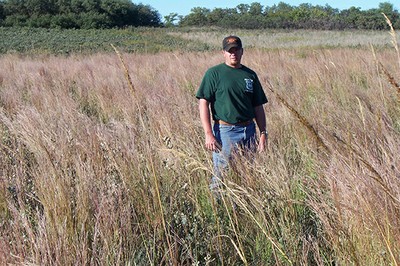Fire Frequency in Sand Shinnery Oak Grassland
The research for this project is conducted at the Black Kettle National Grassland located in Roger Mills county.
Location: Roger Mills County
- Unit 41: 4 miles north and 1 mile east of Reydon, OK
- Unit 1: 12 miles north and 5 miles west of Cheyenne, OK
- Packsaddle Wildlife Management Area, Ellis County: 17 miles south and 2 miles east of Arnett, OK
Land Owner: US Forest Service and Oklahoma Department of Wildlife Conservation
Date Initiated: 1995
Plots: Each site has 12, 30m x 60m plots
Treatments:
- Control (no burn)
- Burn fall every 2 years
- Burn fall every 5 years
- Burn winter every 2 years
- Burn winter every 5 years
- Burn spring every 2 years
- Burn spring every 5 years
Publications from Area:
- Boyd, C.S. 1999. The effects of burning season and frequency on the vegetative characteristics and insect abundance of Sand Shinnery Oak range in western Oklahoma. PhD. Dissertation, Oklahoma State University, Stillwater, OK.
- Boyd, C.S. and T.G. Bidwell. 2002. Effects of prescribed fire on shinnery oak (Quercus havardii) plant communities in western Oklahoma. Restoration Ecology 10:324-333
- Boyd, C.S., and T.G. Bidwell. 2001. Influence of prescribed fire on lesser prairie-chicken habitat in shinnery oak communities in western Oklahoma. Wildlife Society Bulletin 29:938-947
- Boyd, C.S., L.T. Vermeire, T.G. Bidwell, and R.L. Lochmiller. 2001. Nutritional quality of shinnery oak buds and catkins in response to burning or herbivory. Southwestern Naturalist 46:295-301
- Harrell, W.C., S.D. Fuhlendorf, and T.G. Bidwell. 2001. Effects of prescribed fire on sand shinnery oal communities. Journal of Range Management 54:685-690
- Peterson, R.S. and C.S. Boyd. 1998. Ecology and management of sand shinnery oak communities: A literature review. U.S. Forest Service GTR-16. Rocky Mountain Forest and Range Experiment Station. Fort Collins, CO.





